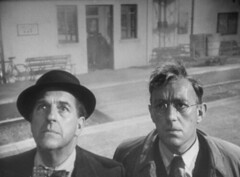- The Daily Beast, April 28, 2011
 |
The Mitt (by DonkeyHotey) |
Take a risk, Willard? As a HuffPost article reports, "Romney got Bain & Company to agree in advance to take him back if he failed, and with all the salary increases he might have received had he remained at the parent company. That is, Romney took no risks, he could not lose, and he would not take the job unless Bain agreed to his terms . . . . Bain agreed that if Romney failed at Bain Capital, it would announce that Romney was returning because the parent company "needed him." "
Smart negotiator. So much for borrowing money from the folks, Willard. This is the same statesman who would cut student aid programs like Pell grants in favor of family solidarity. Where did he come from, anyway - Bloomfield Hills? How would it play out in the real world, a family conversation inspired by Romney's trenchant business savvy, financial independence, and a highly risk-averse capitalist derring-do? Probably something like this:
So, Dad, could I talk to you for a minute?
So do you have a job yet? Besides the Starbucks thing I mean. You thinking of maybe getting your own place one of these days? Do I have any gas in the car?
Well, that's sort of what I wanted to talk to you about.
Oh, now you're talking to me. Am I going to regret this? Did you finish the lawn? Why do I sound like George Costanza's father when I'm talking to you?
Frank Costanza
I really want to start my own business. I'm just going nowhere working for a corporate franchise. I mean, they don't even want to see me in Seattle. Starbucks doesn't.
Not in Seattle, eh? Sounds like maybe I'd like Seattle. So . . . talk.
It would help if you didn't sigh like that.
Sorry. You were saying?
Ummm . . . well, I think about $20,000 would get me started. If you could just loan it to me I could start my own business. I just think I'd be better off pursuing my own dreams.
I know what you dream about, your mother and I can hear you.
I'm trying to be serious.
Well, think about this then - how can I lend you $20,000? I just lost my shirt on some low-interest Czechoslavakian bonds. So I'm going to retire on what? You going to finance me when you're a tycoon?
What . . . there hasn't been a Czechoslovakia for 20 years.
Sheesh - no wonder those dividends dried up. So what was Romney's guy talking about the other day? I thought he mentioned an embassy or something.
See, exactly what I'm getting at, Mitt Romney. Mitt Romney has this friend who started a pizza business which is now the third largest pizza franchise in the country, and he started it with a loan from his parents - $20,000. The price of a new Toyota Corolla. Which I figure is what I need.
You need a car?
No, no, I need a loan - the cost of a car.
Where did this Romney come from, anyway - Bloomfield Hills? You'd have to sell a lot of pizzas to pay me back - I'd probably be dead before that happened. And you can't repay me in pizzas. I can't eat pizza, I'm looking at a bypass, a sausage pizza could kill me, you know that.
I wasn't really thinking of selling pizzas.
What then?
I was thinking of a tattoo business - "Poetry in Motion," "A Moveable Frieze," "Pictures on an Exhibitionist," something literary like that. You, know, with a really good sound system, comfortable chairs, refrigerator, wide screen TV and all.
Talk to your mother.
Mom doesn't have any money.
Bingo. My very point. Go clean your room.











































